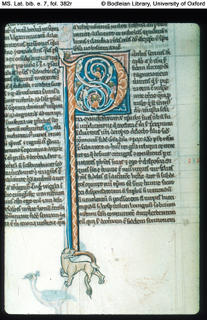
The Epistle of St. Paul to Titus, Chapter 1
1 Paul, a servant of God, and an apostle of Jesus Christ, according to the faith of the elect of God and the acknowledging of the truth, which is according to godliness: 2 Unto the hope of life everlasting, which God, who lieth not, hath promised before the times of the world: 3 But hath in due times manifested his word in preaching, which is committed to me according to the commandment of God our Savior: 4 To Titus my beloved son, according to the common faith, grace and peace from God the Father, and from Christ Jesus our Savior. 5 For this cause I left thee in Crete, that thou shouldest set in order the things that are wanting, and shouldest ordain priests in every city, as I also appointed thee: 6 If any be without crime, the husband of one wife, having faithful children, not accused of riot, or unruly. 7 For a bishop must be without crime, as the steward of God: not proud, not subject to anger, not given to wine, no striker, not greedy of filthy lucre: 8 But given to hospitality, gentle, sober, just, holy, continent: 9 Embracing that faithful word which is according to doctrine, that he may be able to exhort in sound doctrine, and to convince the gainsayers. 10 For there are also many disobedient, vain talkers, and seducers: especially they who are of the circumcision: 11 Who must be reproved, who subvert whole houses, teaching things which they ought not, for filthy lucre's sake. 12 One of them a prophet of their own, said, The Cretians are always liars, evil beasts, slothful bellies. 13 This testimony is true. Wherefore rebuke them sharply, that they may be sound in the faith; 14 Not giving heed to Jewish fables and commandments of men, who turn themselves away from the truth. 15 All things are clean to the clean: but to them that are defiled, and to unbelievers, nothing is clean: but both their mind and their conscience are defiled. 16 They profess that they know God: but in their works they deny him; being abominable, and incredulous, and to every good work reprobate.
I risk repetition on the topic of apostolic authority, but it's only because Paul repeatedly stresses this central theme in his letters. In his letter to Titus Paul raises the matter again before he even concludes his greeting!3 But hath in due times manifested his word in preaching, which is committed to me according to the commandment of God our Savior... 5 For this cause I left thee in Crete, that thou shouldest set in order the things that are wanting, and shouldest ordain priests in every city, as I also appointed thee
How does Paul understand God's word to be "manifested" "in due times"? Elsewhere he elaborates on Jesus Christ as the Word made flesh, but here his focus is on the Word of God in its verbal form, which is transmitted primarily "in preaching", and by teachers designated through the authority of the apostles. 
By whose preaching? Paul's... and the other apostles and those whom they have ordained to the task. Again and again through Paul's letters he refers to the special commission that the apostles have uniquely received, and which distinguishes them as authoritative both in teaching and in governing the Church. Paul's Church is not one in which one is a teacher or pastor simply because he feels the urge, or because his friends voted to approve him to the role. It's a matter of apostolic authority, and Paul is uncompromising on it. For him it's vital to preserving and proclaiming the full Gospel in a world in which there are so many distorted gospels and counterfeit teachers.
In this chapter, he reminds Titus that just as he, Paul, was "committed" the Gospel by the "commandment of God", so he has now appointed Titus to carry on this mission and to carefully appoint other men to share in this role through the ministries of priest ("presbyter") and bishop ("overseer").
Throughout these letters to Timothy and Titus, does Paul ever offer an alternative to this model of apostolic ministry?
Monday, July 11, 2005
Titus 1: "...I also appointed thee"
Posted by
John F Robin
at
7/11/2005 08:09:00 PM
![]()
Labels: apostolic tradition
Subscribe to:
Post Comments (Atom)



No comments:
Post a Comment
Thoughtful comments are welcome. Thank You for visiting!.
(Comments are moderated and usually approved the same day.)